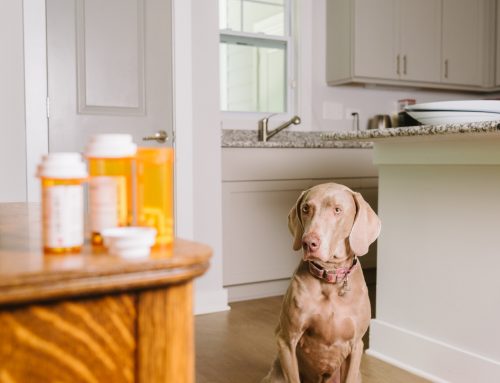“My face may be white, but my heart is pure gold. There is no shame in growing old!” Hey pet parents! It’s Boo the dog again, and that’s a motto I try to remember as I grow older. Aging means having the gift of time to enjoy our lives with our families, but it can also come with difficulties. Just like our humans, when we age, there is a whole new set of health considerations to keep us in our best shape. Whether you have had your fur baby since he or she was little or you adopted an older pet, you may have many questions about caring for aging pets. I’m here to provide some answers!
Q: At what age is my dog considered a senior pet?
A: When determining if your pet is a “senior” you need to evaluate their size and breed. For small cats and dogs, geriatric age is usually considered to begin at age 7. Because larger animals tend to have shorter life spans, they are considered senior a little earlier, around 6. Each dog and cat are different, and how quickly they age also depends on genetics, diet, and activity levels, just like humans. Many people like to think about their dog or cat in human years when considering their age. There is not an exact formula to follow, but in general, every 7 dog or cat years is about 45 human years.
Q: What are the basic things to know about aging pets?
A: If you have an older pet, there are some pretty basic things to know about their overall health. First of all, older pets are not all that different from older humans. Their metabolism slows, and they become more sensitive to temperature changes, overheating easily in the summer and needing a little more insulation in the winter. Secondly, they need regular exercise, but it shouldn’t be as strenuous as it would’ve been in their younger days, as heart and lung function tend to weaken as dogs grow older. Finally, diet and nutrition are important things to focus on as your pet ages. Maintaining a healthy weight so joints aren’t overstressed will help them stay mobile as long as possible. Ask your veterinarian for advice and look into foods formulated specifically for senior pets.
Q: What are some things to expect from my aging pet?
A: Dogs and cats tend to face new illnesses or diseases as they grow older. Arthritis is common in aging pets, and they might not be as mobile as they were in their younger days. Many pets also develop dental issues. Older pets are more susceptible to cancer, heart disease or kidney and liver diseases. While the possibility of facing new illnesses is higher in geriatric pets, not all pets develop these diseases. However, it’s important to recognize the signs and symptoms to catch things early. If your pet has sudden appetite or weight changes, difficulties breathing, or new lumps and bumps, get them examined by your veterinarian.
Q: Will my pet’s personality change as he or she ages?
A: Pets change physically as they grow older, but many also change mentally and behaviorally. Sometimes behavioral changes can signify disease, so if you have concerns about a sudden difference in your pet’s behavior, ask your veterinarian. Otherwise, you may expect changes due to deterioration of cognitive function as your pet ages. These changes might include confusion, increased anxiety, disorientation and overreaction to sounds. If you feel these changes become overwhelming for your pet, there are medications and special diets that can help ease the symptoms.
Q: What are some things I can do to keep my pet healthy?
A: Before your pet displays specific symptoms of aging, there are some general things you can do to keep them in their best shape. First of all, it’s important not to skip vet visits as your pet ages. These checkups are vital to catching any physical changes that could be the sign of something serious. Secondly, feed your pet high quality food that is formulated for their size and activity level. Dental care is also a priority in aging pets, so brush their teeth regularly or give them dental cleaning treats or toys. Finally, make sure your dog gets enough exercise. Figure out what the appropriate amount is to keep them in shape, but not overexert them, as geriatric dogs tire more easily than their younger counterparts.
Q: How will I know when to consider end of life options?
A: Unfortunately, at some point you may have to start thinking about the end of your pet’s life, especially if they begin suffering from certain diseases or illnesses. Whether or not to euthanize your pet at the end of their life is one of the hardest decisions you may ever have to make. The most important thing to consider is your pet’s quality of life. Evaluate their pain and discomfort levels and weigh it against the times when they seem happy and content. Good veterinarians will also make appointments with you to discuss your options and help you evaluate your pet’s situation so you can make the most educated decision possible.
Hopefully that helps answer some preliminary questions about your aging pets. While it’s not the most uplifting topic to discuss, it’s important to know what to expect and how to care for your aging fur babies. It can be difficult to see your pets grow older, but it’s also a blessing to have all those years together! Check back next time, pet parents, for more advice from me, Boo!



Leave A Comment
You must be logged in to post a comment.